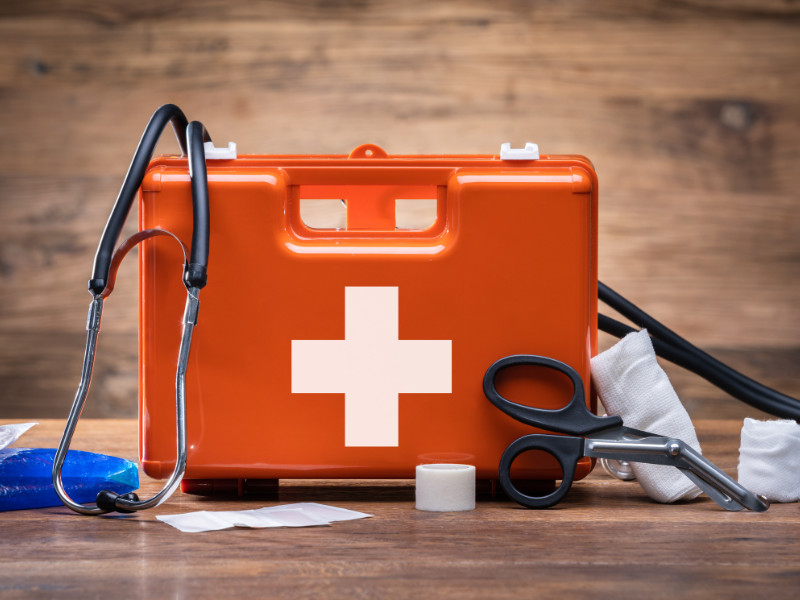It’s time to talk about your emergency medical kit. Whether it’s you or your kids that are dealing with scraped-up knees or an irritating bug bite, it’s crucial that you have a first aid kit to deal with these kinds of injuries. That’s especially the case when you have a serious injury and you’re not anywhere close to trained medical professionals.
But you don’t want to settle for just any medical kit because then you might not have all the essentials to treat certain medical issues.
What’s an Emergency Medical Kit?
Every family should have an emergency medical kit on hand in case there is a dangerous situation. Cuts, bruises, burns, scrapes, or even broken bones can all be dealt with faster when you have an emergency medical kit on hand.
1. Bandage Strips
For those of you with children, you’re definitely going to be needing hundreds of band aids to treat every little boo-boo that they experience. But even if you don’t have kids, bandages are still a must for treating cuts and scrapes.
You’ll want to make sure that you have a variety of sizes and shapes to accommodate different kinds of injuries.
2. Hydrocortisone Cream
This is great for when you have bug bites or poison ivy because it helps to soothe the itchiness and inflammation.
3. Alcohol Wipes (Must have for an emergency medical kit)!!!
Alcohol wipes are great for cleaning wounds and preventing infection.
4. Hand sanitizer
It’s important to keep your hands clean, especially if you’re handling wounds. Hand sanitizer is a great way to make sure that your hands are clean when there’s no soap and water available.
5. Sanitary pads
Not only are sanitary pads great for absorbing blood, but they can also be used to apply pressure to a wound.
6. Antibiotic Ointment
This is a great way to prevent infection in small cuts and scrapes. Just make sure that you apply it before you put on a bandage.
7. Tweezers
Tweezers are great for removing splinters and other small objects from the skin.
8. Scissors
Are you wondering why I would include tweezers and how they could possibly be helpful? Scissors can be used to cut bandages and gauze. They can also be used to trim hair out of the way so that you can better see a wound.
9. Adhesive Tape
Adhesive tape can be used to hold bandages in place or to tape up a ripped piece of clothing.
10. Cotton Balls
Cotton balls can be used for a variety of purposes, such as cleaning wounds, applying the medication, or removing makeup.
11. Safety Pins
Safety pins can be used to hold bandages in place or to close up a ripped piece of clothing.
12. Pain Relievers
Whether it’s ibuprofen or acetaminophen, pain relievers are essential for reducing pain and inflammation. They can also help to reduce fever or an irritating headache.
How to Stock Your Home Pharmacy
13. Allergy Medication
If you or anyone in your family is allergic to bee stings, pollen, or anything else, it’s important to have allergy medication on hand in case of an emergency. EpiPens are also a good idea if someone in your family has severe allergies.
14. Antacids
At least for me, at night is when I always seem to be dealing with heartburn from a meal that I ate too late in the evening. Indigestion can be incredibly painful, and antacids can help to relieve that pain. They can also be used to treat heartburn.
15. Cough Drops
Coughing can be very irritating, especially when it’s persistent and you’re in class or a meeting trying desperately to suppress a coughing episode. Cough drops can help to soothe a cough and make it more bearable.
16. Decongestant
A stuffy nose can make it difficult to breathe, and a decongestant can help to clear out your nasal passages.
17. Eye Drops
If you suffer from dry eyes or if your eyes are irritated, eye drops can help to provide relief.
18. Thermometer
A thermometer is essential for checking whether or not someone has a fever.
19. Gauze Pads
Gauze pads are perfect for covering larger cuts and scrapes. They can also be used to apply pressure to a wound.
20. Cold Packs
If someone has a fever, a cold pack can help to bring down their body temperature. Cold packs can also be used to reduce swelling.
21. Hot Packs
If someone is dealing with muscle pain or cramps, a hot pack can help to provide relief.
22. Rubbing alcohol
A wound that gets infected can become a very serious problem if left untreated for too long. Rubbing alcohol can be used for cleaning wounds or sterilizing needles.
23. Needles
If you need to stitch up a wound, you’re going to need needles. You’ll also need needles if you need to give someone a shot of adrenaline in the case of anaphylactic shock.
24. Syringes
Syringes are necessary for giving shots and for drawing up medication.
25. Tourniquet
A tourniquet can be used to stop bleeding from a major wound.
26. Super Glue
This next item on my list isn’t only something that you have to purchase for your child’s back to school list. Super glue can be used in a pinch to close up small cuts and scrapes.
27. Aluminum Finger Splint
An aluminum finger splint can be used to immobilize a broken or sprained finger.
28. Tongue Depressors
Tongue depressors can be used to keep the tongue from blocking the airway in case of an injury or an allergic reaction to the mouth or jaw. This one may sound a bit over the top but it would be better for you to be safe than sorry.
29. Medication
If you or someone in your family has a chronic illness, it’s important to have their medication on hand in case of an emergency. This could include inhalers for asthma, insulin for diabetes, or EpiPens for severe allergies.
30. First Aid Manual

Not sure how to deal with a certain type of injury? When in doubt, consult a first aid manual. It can be incredibly helpful in times of emergency. And you don’t have to wait until an incident occurs to consult it, so take the time to learn and have an idea on how to treat the different types of bodily injuries before an accident happens.
More Emergency Tips
- Emergency Essentials Every House Should Have
- 10 Emergency Items to Keep in Your Car
- The Best Supplements to Stockpile
- Creating a Get Home Bag
- How to Store Blankets for Emergencies
These are 30 medical supplies that everyone should have in their emergency medical kit. By having these items on hand, you’ll be better prepared for anything that comes your way. What would you add to your emergency medical kit?





